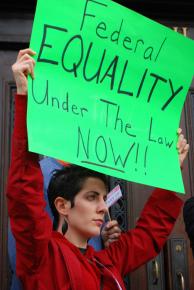Marriage equality defeat in N.Y.
analyzes what's behind a seback for equal marriage rights in New York.
THE LONG-awaited vote on New York state's same-sex marriage bill finally came December 2--and resulted in a resounding 38-to-24 defeat for equal rights, confusing and angering supporters who thought the measure would pass.
The bill to legalize same-sex marriage in New York was supported by every statewide elected official, and had been approved by New York's other legislative body, the State Assembly, three times already, each time by a wider margin. Democrats Thomas Duane, the state senator who sponsored the bill, and Gov. David Paterson, who called a special session to force the Senate to debate and vote on this and other measures, had repeatedly said they believed they had the votes to pass the legislation.
But the slim Democratic majority in the Senate split in the vote, with eight Democrats joining a unanimous Republican bloc in opposing the measure. Duane claimed after the vote that several colleagues broke their promise to vote against equality.
The defeat in New York was the second blow to the LGBT equality movement in as many months. In Maine, voters narrowly approved a ballot measure repealing same-sex marriage after it had been granted legislatively earlier in the year. Seven states achieved marriage since 2003, either legislatively or with a court ruling, but statewide referendums stripped those rights in California last November and Maine last month.
Now, the focus shifts to New Jersey, where the legislature is expected to vote on a same-sex marriage bill this week. As in New York, a few months ago, the marriage equality measure was expected to pass, and be signed into law by Gov. Jon Corzine. But since the election, which Corzine lost, a number of Democrats have jumped ship.
The religious right was quick to gloat after the New York vote. In a letter to donors, National Organization for Marriage (NOM) Executive Director Brian Brown wrote: "This great victory will reverberate up and down America, putting the fear of God--and the American voter--into the hearts of weak-kneed and weak-willed politicians everywhere." NOM is furiously soliciting funds to devote to the battle over equal marriage in New Jersey.
Yet public opinion on marriage equality is in stark contrast to both the right wing's triumphalism and the legislative setback in New York. A Marist Institute opinion poll released the same day as the state Senate vote showed 51 percent of registered New York voters supporting same-sex marriage, and 42 percent opposed.
LGBT New Yorkers and their allies were upset, but not silenced, in the wake of the vote. Hundreds came out to an impromptu Times Square protest hours afterward, where the names of the Democrats who voted against the bill were called out one by one, with boos after each. At another protest the next day, over a thousand people flooded Union Square to express their outrage at the Senate's decision. Paterson and Duane both spoke.
"I'm pissed off," Eugene Lovendusky, a 24-year-old teacher who has lived in New York for three years, told Gay City News. "I come from California, and I'm already a second-class citizen there. Now I'm a second-class citizen here. I don't know where I can call home."
IF THERE was a bright spot in what happened, it was the Senate debate on the legislation--which showed a very different picture from the conventional wisdom that African Americans are leading opponents of same-sex marriage. The Senate's Black and female members showed the greatest support for the bill, repeatedly summoning parallels from past civil rights struggles during their speeches.
State Sen. Eric Adams of Brooklyn said: "I have religious beliefs, but when I walk through those doors, my Bible stays out. You don't have to be gay to respect that two people who meet and fall in love deserve to be married. You don't have to be Black to understand the pain of slavery."
Harlem state Sen. Bill Perkins directed his comments to same-sex marriage supporters in the gallery, saying, "Thank you, movement. Thank you for your vigilance and your push to get us where we are today...I can see Dr. Martin Luther King smiling down on us today, recognizing that his sacrifice was not in vain."
But it was fellow Democrats who provided the margin of victory for the right. State Sen. Rubén Díaz Sr., a conservative Pentecostal minister representing the Bronx, who claims his opposition to same-sex marriage is "nothing personal," was the only senator--Republican or Democrat--to speak against the bill. Díaz's opposition was expected, but the other Democrats who sided with the Republicans against equal rights were the key to dooming the bill.
The protests that took place in New York after the Senate vote--like the national demonstrations after the referendum defeats for equality in Maine and California--will be important in keeping the movement going and showing how the tide can be turned.
The emphasis on lobbying by organizations like Empire State Pride Agenda turned out to be misplaced. The $1 million-plus funneled toward winning legislative support for marriage equality didn't even get us close in the state Senate.
The key to regaining momentum in the struggle for LGBT equality--on marriage and every other question--will depend on the struggle from below. We need a movement that goes beyond the state-by-state lobbying focus of established LGBT organizations to demand that the federal government act on equality before the law.



